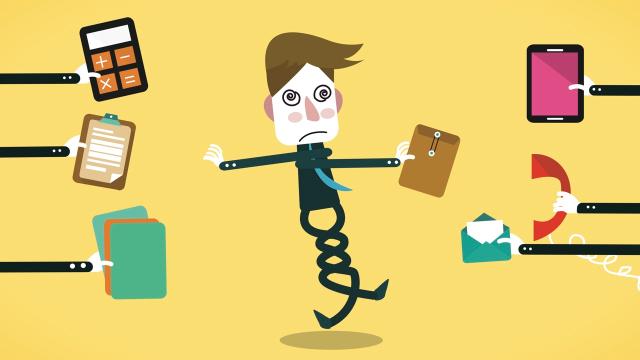We talk a lot about time management, but for all our efforts to set aside time to tackle important projects, we miss overlooking one key thing: being able to focus on actually completing them instead of constantly switching tasks.
Businessman image via Shutterstock
This post originally appeared on Fast Company.
The reason concentration can be such a struggle even after you clear space in your schedule is that your brain gets accustomed to operating in a rapid-fire, reactive mode. Intentionally or otherwise, many of our workplaces and working habits encourage that high-octane cognitive state. And unless you deliberately shift mental gears beforehand, you’ll be fighting against it the whole time you’re trying to focus on that one big project. These seven strategies can help you slow your mind down in order to focus on important work.
1. Schedule a Meeting… With Yourself
If you wait until your important project becomes urgent before starting to work on it, it’s probably already too late. The whole point is to sidestep the pressure of urgency on your ability to focus. Instead, schedule a “meeting” with yourself where you plan to do nothing but work on that task. Then make it a priority to keep that meeting. That will help you avoid the trap of not even attempting to focus because of all the smaller, more urgent things you could knock out more quickly. What’s more, you’ll have primed your brain in advance to anticipate upcoming focused time.
2. Shift Into Low Gear and Stay There
To make focusing as easy as possible, dig into your important work after taking a natural break from the more urgent stuff. Maybe that’s as soon as you arrive in the office — ideally, a little while before other staff begin to trickle in — or right after lunch. In both cases you avoid getting your mind too revved up with quick wins just before you need to concentrate.
3. Take a Short Break
When you can’t avoid shifting into get-it-done mode before you work on your important tasks, at least take a quick break before you attempt to buckle down. Go on a short walk outside, even if it’s just for a few minutes. It can calm you down and help you shift into a more diffuse, creative mode, as opposed to a divide-and-conquer mind-set. That can also help you start to think more strategically — rather than just executionally — about how you want to accomplish what you need to. Whether it’s thinking through a project plan, writing an article, or putting together a presentation, you can start to think through the big picture before setting about realising it, so that once you sit down, you already have a sense of your approach.
4. Designate a Place for Focusing
Instead of staying in the same location where you do urgent, tactical work, move to a different place when it’s time to do the important stuff. This could mean reserving a conference room, working from home, going to a library, or setting up at a coffee shop. When you go to that new place, try to avoid answering email or doing any other non-urgent tasks. This trains your brain that when you’re in that location, you focus only on important projects, much the way your mind understands that when you’re in bed, you sleep. (If it’s possible and practical, you might even want to go to a location without an internet connection.)
5. Step Away From Your Computer
The same way your mind can associate being in a certain location with a certain type of mental activity, you can also unconsciously link being in front of a screen with a certain style of thinking. When you need to do more creative, reflective work and find yourself staring blankly at your computer screen, try a different medium. That could mean pulling out a pen and paper and starting to write out your thoughts down, or even beginning by diagramming your ideas on a white board. This may seem to take longer because you’d need to type up your notes afterward, but it can actually help you achieve the outcome much faster because it gets your brain into the right mode from the very start.
6. Toggle Between the Important and the Urgent
If all else fails, try toggling between the important task and the urgent ones. Maybe you can spend just 10 minutes on the important project and then five minutes on the urgent stuff. Or you could divide and conquer: complete one major step on the big project before giving yourself permission to answer a few emails. This isn’t the most efficient way to approach an important action item, but if it helps you get unstuck, it may be the most effective one at your disposal.
7. Enlist Positive Peer Pressure
A second last-resort move is to enlist a colleague to help keep you responsible. Maybe a coworker is also struggling to pin down time to tackle a big project in a busy environment. Find an hour you can both spare and plan to spend that time doing your own important projects together. You could even talk to your boss and set up a series of quick check-ins where you’ll be providing status updates on a particular initiative. This accountability can help you push through and make the important work feel as urgent as the smaller tasks you’re so used to knocking out right away.
There will always be pressure to drop what you’re focusing on and reply to the notification on your phone or computer, but you can take these extra steps to set aside time for focus and get to your less urgent but more important tasks.
7 Strategies for Regaining Focus in a Hectic Workplace [Fast Company]

Comments